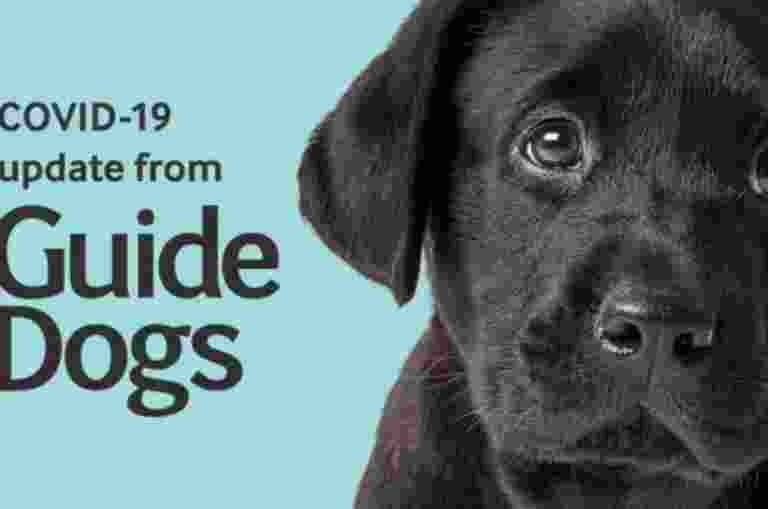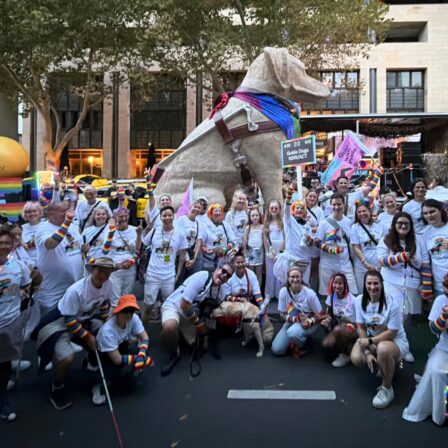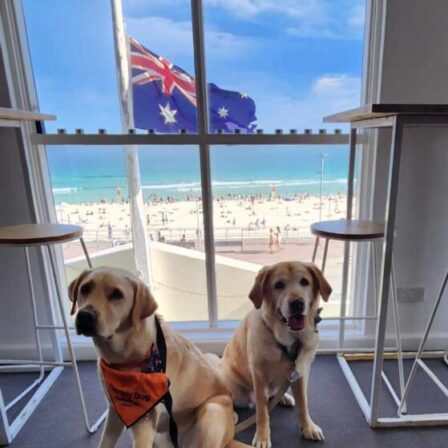News
COVID-19: Business Continuity Update

Update 20.05.20
Client update on servicing arrangements and supports
With the NSW and ACT Governments’ cautious easing of some COVID-19 restrictions, Guide Dogs NSW/ACT (GDN) has reviewed its own servicing arrangements and is making some important changes, including the gradual resumption of face-to-face services. Read on for details, along with tips on how to keep your Guide Dog active and healthy during these restrictions; accessible options for COVID-19 testing; and what’s in focus for Macula Month.
Gradual resumption of face-to-face Client services
The NSW and ACT Government’s easing of restrictions will enable GDN to start resuming face-to-face services. This will require additional training for our Client Services practitioners to incorporate new safety protocols and procedures for any in-person consultation and training.
The health and wellbeing of our clients, workforce, dogs and the community remains our highest priority at this time. This means that any initial phasing of face-to-face services will be restricted to clients whose specific needs are best addressed in person, and who choose this as their preference for receiving services from GDN.
Telepractice will remain the primary platform for delivering services and will be encouraged where possible. For example, our Connection Services are specifically designed to provide a link to other clients, staff and community through telepractice or virtual means. Please note too that our office locations and services including the Low Vision Clinic remain closed for clients until further notice.
As we work through these changes we will ensure that all necessary measures are taken to mitigate any risks and adhere to the advice and regulations set down by relevant government authorities.
Over the coming weeks, we will be consulting all clients who are currently receiving services so that we can discuss with you your priorities and options. We have already spoken with Client groups whose members have helped inform our approach to the gradual and safe return to face-to-face services. If you would like to register your own individual feedback please contact us by phone on 1800 484 333 or send an email to feedback@guidedogs.com.au
One issue some clients have already raised with GDN is around the timing for resuming services with school aged children. Through consultation with RAC members we understand parents may prefer GDN to defer any resumption of services for a few weeks to enable students to adjust to new regimes within their school environments. Alternatively, where a parent or carer is keen for our services to recommence quickly we would need to abide by government regulations and understand school conditions for entry. Again, please contact us if you have any questions on this matter.
Tips for keeping Guide Dogs active and healthy
Guide Dogs need to maintain a training routine and enjoy some regular exercise if they are to remain fit and healthy and do the job for which they have been specifically bred and raised.
Some Guide Dog Handlers have been asking for some basic tips on how to achieve a good routine for their dog while physical and social interactions remain restricted. Following are three areas on which you could focus:
1. Short Walks
Short walks every day are highly beneficial for your dog and will ensure he or she gets some regular exercise. Always choose a route that is familiar to you and avoid busy areas to ensure social distancing for you and your dog.
2. Sharpening up skills
There a number of things you can do each day to maintain your dog’s skills such as:
- placing your dog’s harness on for a few hours each day, including leaving it on for an hour or so after a walk
- having your dog sit at your feet under your seat or desk with their harness on for an hour or more, particularly if you normally take your dog to work or study outside of the home
- target specific door and seat behaviour
- freshen up your dog’s obstacle skills using bins in the driveway, or even some items in the home
- teach basic obedience such as sit, lie down, go to bed, stay, etc
- use enrichment toys so your dog can remain interested and alert.
3. Grooming
Guide Dogs need regular grooming to keep their coat in good condition. Always brush your dog with long strokes, starting from the nape of the neck down the back or flanks, and then down the thighs. Don’t forget the tail.
If it is too difficult to give your dog a bath at this time you can moisten a towel and rub your dog all over to remove any loose dirt. Your dog will love it.
If you want further information or have any specific questions about caring for your during these times, your Guide Dog Mobility Instructor will be pleased to hear from you.
Accessible options for COVID-19 testing
Some clients have raised questions about what accessible options are available for testing for COVID-19 for people with blindness or low vision should they develop symptoms.
We contacted the COVID-19 Help Line and were advised that there are three options available:
Participating hospitals
Participating hospitals are providing safe and accessible testing facilities both inside and outside their premises. You will need to check with your local hospitals to determine if they are providing this service.
General Practitioners
Some General Practitioners are providing testing for COVID-19 inside and outside their premises. You will need to contact your local GP to determine if they are offering these tests and what processes are involved.
Drive-through testing as a passenger
You can attend a drive-through testing facility as a passenger. Because the driver is considered a Carer for health care reasons, and the travel will be identified as essential, then he or she will not be breaching any social distancing laws or other restrictions.
To find a testing centre in your local area visit the NSW Government’s COVID-19 testing website or the ACT Government’s COVID-19 testing website.
Macula Month
May is Macula Month and the Macular Disease Foundation of Australia (MDFA) wants to remind all Australians experiencing macular degeneration, or at risk of developing macular disease, to understand the importance of seeking treatment.
The MDFA has been most concerned with the significant decline during the COVID-19 restrictions in those seeking sight saving treatments such as intravitreal injections for neovascular age related macular degeneration and diabetic macular oedema.
A new community campaign focusing on Australians at risk and featuring the MDFA’s patron, Ita Buttrose, launches on May 16 across mainstream and social media.
Visit the Macular Disease Foundation of Australia website for more information about the Foundation and this latest campaign.
————————————————————————————————————————————-
Update 17.04.20
We have expanded our telepractice service delivery options
Telepractice is a method of providing services from a distance using communications technology like a phone or internet connection. As a Guide Dogs client, you only need access to a phone to get started with telepractice. Some programs work best with an audio and video connection, which can be accessed using the internet on a Smart Phone, tablet or computer.
All Guide Dogs services are now offered through telepractice. With some modifications to the way we normally work together, services delivered through telepractice are as safe and high quality as our usual in-person services. Some Orientation & Mobility and Guide Dog Mobility services which usually take place in public may be particularly impacted by mandatory social distancing requirements. Our specialists can work with you to determine your current mobility goals and options to keep working towards them at this time.
Guide Dogs staff have been busy contacting as many active clients by telephone as possible to discuss their individual service needs and seek feedback on their experience with social distancing and accessing essential services and information. If you would like to access one of our services through telepractice, or provide feedback on your experience, please contact our team on 1800 804 805.
GDN NDIS Support Program Expanded
NDIS is experiencing higher demand for services due to the COVID-19 restrictions and as a result has brought forward many client annual reviews. We understand this has caught some clients off-guard and to assist GDV is expanding its NDIS support program with our NDIS specialists for all eligible clients (including those who are unfunded) for a limited time.
Our NDIS specialists can help to plan for an annual review, provide simple advice, make referrals to practitioners to recommend specific Assistive Technology or additional services.
Practitioner services can be claimed through current NDIS plans or through philanthropic funding if clients are out of funds or without an existing plan.
GDN has also made the decision not to charge clients the additional 10 per cent loading on some NDIS services which the Australian Government has introduced to provide financial relief to providers. These services include:
- core supports (Assistance with Daily Life (excluding Supported Independent Living) and Assistance with Social and Community Participation)
- capacity building supports (Improved Daily Living).
Additionally, we will not charge for cancellations in accordance with our current policy.
Food and grocery shopping
Woolworths and Coles have established priority online shopping for people with a disability or who are over 65 years of age. Go to Woolworths Online Priority Shopping or Coles Online Priority Shopping.
NDIS funded clients can access a priority home delivery service for grocery items following an agreement between the NDIA and the major supermarket retailers. Visit the Priority Home Delivery Service page on the NDIS webpage.
NDIS sent out a unique home delivery access code to clients on NDIS by SMS or email. This code is required for supermarket online ordering priority shopping. If you did not receive your code then we recommend you contact your local NDIS office.
If you are over the age of 65 and registered with My Aged Care then you will be required to use your My Aged Care ID number when using the priority shopping.
Online Education
Schools and other educational institutions are required to provide accessible education resources to students who need them. It is important therefore to check first with the school/institute if you and/or your children require assistance with accessing online education resources. Please contact your local Guide Dogs staff member if you are not able to receive assistance from the school/institute to discuss what we may be able to do to assist you.
We would be happy to receive your feedback on any of the information provided or for you to raise issues that have not been addressed. Please call us on (02) 9412 9300 or alternatively contact your local Guide Dog services staff member.
——————————————————————————————————————————————–
Update 08.04.20
Keeping the Guide Dogs community connected during COVID-19
Here at Guide Dogs, we know how powerful social media can be in keeping people connected, especially those members of our community who are most vulnerable or isolated.
At a time like this, it has been important for us to step back and review how we are currently using our social media channels and how we can harness them to add real value to our followers’ lives.
As you can imagine, we are also faced with some challenges in this space. Our access to people and dogs is obviously limited right now, making it difficult to create the volume of lively and engaging content we would love to.
So, we’ve been working hard to come up with a solution that will enable us to keep our followers up to date, be even more agile in our responses, provide light relief during an otherwise dark time, and support our national partners, some of whom are also going to be doing it tough right now.
From today we will be streamlining our social channels, starting with utilising the Guide Dogs Australia Facebook page as our single point of contact for followers across New South Wales and the Australian Capital Territory as well as Victoria.
This doesn’t mean we are merging into one organisation. But by joining forces online, it does mean we can harness the creativity and resources of our social media teams around the country to bring our followers the most up to date, relevant and engaging content, and will ensure we can be more responsive and better able to support the Guide Dogs community during this challenging time.
Follow Guide Dogs Australia accounts for more pupdates:
Facebook: https://www.facebook.com/GuideDogsAustralia/
Instagram: http://instagram.com/guidedogsaustralia
Twitter: https://twitter.com/GuideDogsAUS
LinkedIn: https://www.linkedin.com/company/18160951/
———————————————————————————————————————————————-
Update 25.03.20:
An important safety message for all Guide Dog Handlers using taxis and ride share services for travel
Some important changes have been made to normal procedures for Guide Dog Handlers using taxis and ride share services such as Uber to further minimise risk during the COVID-19 pandemic.
The most important change is that all Guide Dog Handlers are being asked to travel in the back seat of the vehicle on the recommendation of the Federal Government, the Taxi Industry, the Ride Share Services sector and Guide Dogs Australia. Guide dogs are now required to sit at the handler’s feet in the back footwell.
This change requires a different approach to entering a taxi or ride share service. Under normal circumstances, Guide Dog Handlers are trained to use the front seat but with new social distancing regulations in place this is no longer advised.
Guide Dog Handlers should ask taxi and ride share services’ drivers to move the front passenger’s seat as far forward as possible to provide room for the dog.
There is no change in advice on exiting the vehicle in that the Guide Dog Handler should exit the taxi/ride share service with their dog as per the normal procedure.
Below are the new recommended steps for Guide Dog Handlers entering and exiting taxis and ride share services:
- When approaching a taxi or ride share service vehicle, do as you would normally do by locating the front passenger door. Then, while facing the vehicle, move one metre to your right and locate the back passenger door.
- Ask the driver to move the front passenger seat as far forward as possible.
- Remove your Guide Dog’s harness so that it does not become caught under the front seat. This is also a more comfortable way for you and your guide dog to travel.
- Place your dog on a long lead and have your dog wait while you position yourself on the back seat.
- Ask your dog to sit at your feet in the back footwell. Make sure the dog’s tail is inside the vehicle before closing the back door.
- When exiting the vehicle with your dog do so as per normal procedure.
- Re-harness your dog and proceed to your destination.
At all times it is essential to keep you and your dog at a safe distance from others to minimise the risk of coming into contact with potential COVID-19 carriers.
————————————————————————————————————————————————————
Update 17.03.20:
Guide Dogs is closely following the recommendations of the relevant government authorities in relation to the containment of the COVID – 19 virus within the community.
We acknowledge that these are challenging times.
Be assured, the health and wellbeing of our Clients, workforce and dogs remains our priority.
We are activating our plan to ensure we have continuity of care to those most in need, in line with the restrictions currently in place.
If you need support immediately, please contact our Customer Service team on 02 9412 9300 or email stleonards@guidedogs.com.au.
In the meantime, please ensure you stay informed on the latest advice from authorities.
Guide Dogs will continue to provide you with regular updates as the situation unfolds.





